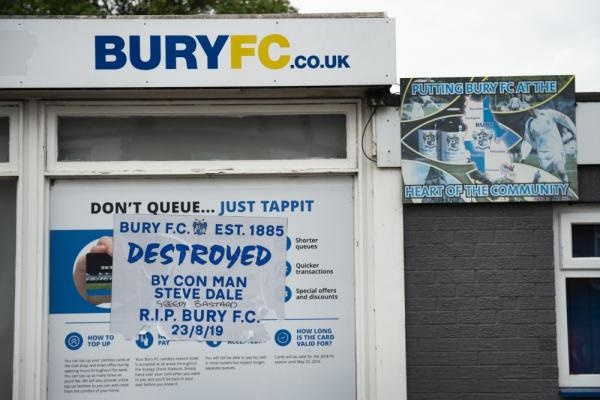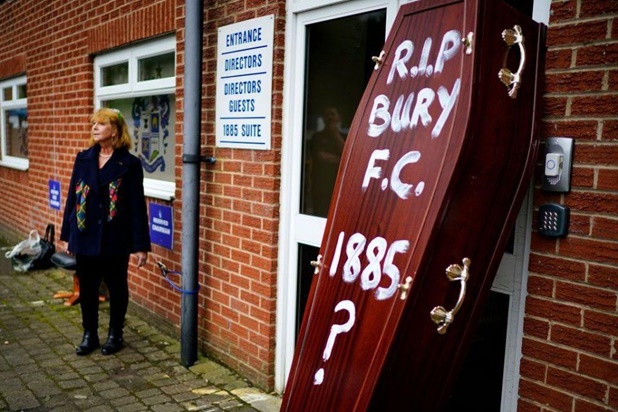Bury FC: English Football’s Shame
Earlier this week, one of the oldest clubs in the English Football League effectively ceased to exist, as Bury Football Club was expelled from League One due to ongoing financial difficulties at the club. The move has brought an end to months of speculation about the potential future of the town’s football team, and also ended 125 years of English league football history for the side known as the Shakers.

The move was not unexpected. Bury had been unable to complete any of their fixtures so far this season, and had already been expelled from the League Cup competition on the grounds that they were unable to take to the pitch. The few players that were still under contract to Bury have gone unpaid for months, and there’s been little in the way of a management structure behind the scenes outside of controversial owner Steve Dale. Dale undoubtedly must shoulder a great deal of the blame for the demise of Bury, but the sorry saga underlines the need for reform of the English Football League as an organization.
The Inaction Of The EFL
The English Football League is the oldest football organization in the world, and was once responsible for the organization of every professional club in the country. Its power over the game has been diminished since the formation of the English Premier League in 1992, but it’s still responsible for the three divisions below the Premier League. Part of its duty is the oversight of the clubs who make up its membership, and it’s in this duty of oversight that many football fans feel the organization is failing clubs and fans badly.
When a new owner becomes chairman of an English Football League club, that owner is supposed to submit to a series of tests in order to ensure that they’re ‘fit and proper’ to run the club. Those tests include criminal background checks, assessment of the potential owner’s wealth in order to ensure they have the money to take over the running of the club, and financial conduct checks. Steve Dale took over as owner of Bury Football Club in December 2018, and almost immediately fell behind with payments to players, and other financial commitments that the club was responsible for. That shouldn’t have been possible if Dale had passed the EFL’s ‘fit and proper’ test.
Around a month ago, it transpired that Dale had indeed never completed the tests. The EFL had sent paperwork out to him, but allowed him to complete his takeover of the club without receiving it back. Dale simply never returned the paperwork, and carried on running Bury into the ground. During interviews, he confirmed that he hadn’t even been aware there was a football club in Bury before buying it, and wasn’t a football fan. To him, Bury was an investment that had gone wrong. To fans of this proud, historic club, it was an act of wanton vandalism – and one which the EFL was complicit in via their acceptance of him as an owner. In the aftermath of Bury’s expulsion, it was made public knowledge that Dale has wound up almost fifty companies during his time as a businessman.
If this sorry saga were an isolated incident, it would be bad enough, but complaints about the EFL’s poor treatment of clubs with rogue owners go back years. Fans of Blackpool have only recently seen the back of Owen Oyston, a convicted rapist who was found guilty of asset-stripping their team for his own enrichment, but allowed to continue in the role. Charlton Athletic, Coventry City, Portsmouth, Leyton Orient, and several more sides have all suffered at the hands of seemingly malevolent owners, while the EFL has sat back and done nothing.

Money Doesn’t Trickle Down
As all football fans know, England is one of the richest countries in the world when it comes to the sport. Television rights for English football come in at billions of dollars a year in value, and the majority of that money goes to the clubs in the Premier League. In the past, the Premier League has spoken of a ‘trickle-down’ effect, whereby some of the money that arrives at the top of the game will filter down to the bottom to help everyone else stay alive. The fate of Bury is stark evidence that this isn’t happening.
There’s a saying in the world of gambling and casinos, which is ‘the house always wins.’ In this instance, the Premier League is ‘the house.’ We can think of all the teams as mobile slots players, trying to win money from the house. With mobile slots, the money paid into the slot is profit, and every now and then a player will win a mobile slots game and take away more than they put into it. In football terms, that happens when a team is promoted to the Premier League, and earns a huge windfall of millions of dollars. Mobile slots websites or their related casinos make money because more players lose than win. Most of the teams in the EFL have no realistic prospect of reaching the Premier League in the next five years. They all lose, and Bury has lost the hardest of all.
To give you an idea of the financial disparity of the English game, Bury were kicked out of the league for debts which are believed to amount to around $3m. A month ago, Manchester United sold unwanted striker Romelu Lukaku to Inter Milan for $80m. For want of less than 5% of the price of a player who was surplus to requirements in the Premier League, Bury went bust. The notion of English football being a ‘family’ has been destroyed.
What Happens To Bury Now?
Nominally, Bury still owns their stadium, and their footballing infrastructure. They’re facing a very real threat of liquidation – in which case, all their assets would be sold – but they could still apply to rejoin English football as a non-league side further down the ladder in 2020 if their financial situation can be resolved. As they’re now a much less attractive proposition to investors without Football League status, it’s hard to imagine anyone coming in and meeting Dale’s asking price – even two days before expulsion occurred, Dale was rejecting bids that he didn’t feel were ‘good enough’ for him to step down.
Other clubs have lost their league status before and come back to life, including Accrington Stanley, Maidstone United, and Aldershot, but it’s a long, hard road ahead for Bury Football Club and its fans. For English football in general, it’s an extremely dark and troubling chapter.